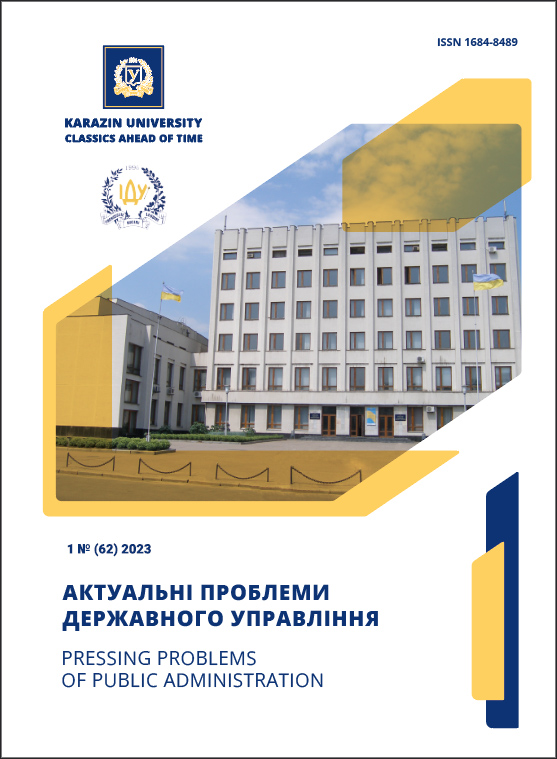Communicative approaches to support desired organizational changes in quality of public services
Abstract
The paper actualizes the issue of the use by the leaders of public organizations of communicative approaches to the implementation of organizational changes and overcoming resistance to improve the quality of public services. The aim of this paper is to investigate the development and promotion of communicative approaches to organizational changes aimed at improving the quality of public services and effectively countering resistance from public organization leaders to these changes
To enhance public service quality and overcome organizational resistance to change, altering perspectives on change is essential. This means shifting how employees view their professional environment. There’s no one-size-fits-all approach; multiple viewpoints coexist regarding understanding a changing world. This explains why some leaders prefer a rational change approach while others opt for experimentation.
The article introduces a communicative approach that stresses the importance of linking internal thought processes to external actions for implementing necessary changes. Thinking skills essential for change formulation are inseparable from social skills needed for execution. Through communication, individuals can change their external environment and their own thinking. This, in turn, can impact public organizations and improve service quality.
The author substantiates that the use of these methods of working with personnel allows to increase in the level of readiness of heads of public organizations at the individual and group levels, to reduce resistance, and to increase the level of efficiency of implementation of organizational changes to improve the quality of public services.
Downloads
References
Baranetska, A. (2021). Information and communication management: crisis practices. Scientific notes of the Tauride National University named after V.I. Vernadsky, tom 32 (71), no. 6 (3), 112–119 [in Ukrainian].
Dzyundzyuk, V.B. (2003). Efficiency of public organizations: monogroup. Khakiv : Publishing house of HarRI UADU “Master” [in Ukrainian].
Dzyana, G.O., Dzyaniy, R.B. (2022). Management of communications in conditions of crises. Dnipro Scientific Journal of Public Administration, Psychology, Law, vol. 2, 13–21.
URL: http://nbuv.gov.ua/UJRN/dnchpu_2022_2_4 [in Ukrainian]
Dreshpak, V.M. (2015). Communications in Public Administration: Teaching Staff. Dniprohpetpovsk: DRIDA NAPA [in Ukrainian].
Maznik, L.V., Berezyanko, T.V., Bezpalko, A.V., Berger, A.D., Grinyuk, Yu.M., Dragan, A.I., Oleinichenko, A.N., Maznik L.V. (2019). Economic and mathematical methods and models in the field of personnel management. Kyiv: Department [in Ukrainian].
Ovsyanyuk-Berdadina, O.F., Ostroverkhov, V.M. (2023). Change management: tutorial. Ternopil: ZUNU [in Ukrainian].
Antonio de Mello, S.J. (1985). The Sadhanna – A Way to Truth. Diaz Del Rio.
Buchanan, D., Boddy, D. (1993). The Expertise of the Change Agent. Public Performance and Backstage Activity. Prentice Hall.
Campbell Quick, J. (1996). Organisation Behaviour. The Essentials. West Publishing Company.
Child, L. (1994). Organizations – A Guide to Problems and Practice. Harper & Row.
Dunphy, D.C., Stace, D.A. (1990). Under New Management. Australian Organisations in Transition. McGraw-Hill. Sydney.
Mackie, D.M., Worth, L.T. (1989). Processing Deficits and the Mediation of Positive Affect in Persuasion. Journal of Personality and Social Psychology, no. 57, 27–40.
Pettigrew, A. (Еd.) (1987). The Management of Strategic Change. Basil Blackwell.
Pollitt, C. (1993). The New Managerialism in the Public Services: the Anglo-American Experience. Basil Blackwell.
Ranson, S., Stewart, J. (1994). Management for the Public Domain. Enabling the Learning Society. Macmillan.
Schroder, H.M. (1989). Managerial Competence: the Key to Excellence. Kendall/Hunt.
Sloman, J. (1991). Economics. Harvester Wheatsheaf, 408.
Starkey, K. (1996). How Organisations Learn. ITP Business Press, 2.
Tomkins, C.R. (1987). Achieving Economy, Efficiency and Effec- tiveness in the Public Sector. Kegan Paul.
Weber, M. (1964). The Theory of Social and Economic Organisa tion. Macmillan.
Zifcack, S. (1994). New Managerialism. Administrative Reform in Whitehall and Canberra. Oxford University Press, 172.

